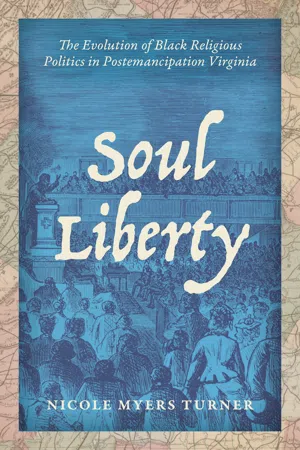
Soul Liberty
The Evolution of Black Religious Politics in Postemancipation Virginia
- 232 pages
- English
- ePUB (mobile friendly)
- Available on iOS & Android
Soul Liberty
The Evolution of Black Religious Politics in Postemancipation Virginia
About this book
That churches are one of the most important cornerstones of black political organization is a commonplace. In this history of African American Protestantism and American politics at the end of the Civil War, Nicole Myers Turner challenges the idea of black churches as having always been politically engaged. Using local archives, church and convention minutes, and innovative Geographic Information Systems (GIS) mapping, Turner reveals how freedpeople in Virginia adapted strategies for pursuing the freedom of their souls to worship as they saw fit—and to participate in society completely in the evolving landscape of emancipation.
Freedpeople, for both evangelical and electoral reasons, were well aware of the significance of the physical territory they occupied, and they sought to organize the geographies that they could in favor of their religious and political agendas at the outset of Reconstruction. As emancipation included opportunities to purchase properties, establish black families, and reconfigure gender roles, the ministry became predominantly male, a development that affected not only discourses around family life but also the political project of crafting, defining, and teaching freedom. After freedmen obtained the right to vote, an array of black-controlled institutions increasingly became centers for political organizing on the basis of networks that mirrored those established earlier by church associations.
We are proud to announce that this book will also be published as an enhanced open-access e-book on a companion website hosted by Fulcrum, an innovative publishing platform launched by Michigan Publishing at the University of Michigan Library. The Fulcrum version of the book can be located using this link: https://doi.org/10.5149/9781469655253_Turner.
Frequently asked questions
- Essential is ideal for learners and professionals who enjoy exploring a wide range of subjects. Access the Essential Library with 800,000+ trusted titles and best-sellers across business, personal growth, and the humanities. Includes unlimited reading time and Standard Read Aloud voice.
- Complete: Perfect for advanced learners and researchers needing full, unrestricted access. Unlock 1.4M+ books across hundreds of subjects, including academic and specialized titles. The Complete Plan also includes advanced features like Premium Read Aloud and Research Assistant.
Please note we cannot support devices running on iOS 13 and Android 7 or earlier. Learn more about using the app.
Information
Table of contents
- Cover
- Title Page
- Copyright
- Dedication
- Contents
- List of Figures, Graphs, Maps, and Tables
- Note from the Author about the Digital Humanities and This Book
- Acknowledgments
- Abbreviations in the Text
- Introduction
- Chapter One: Making a New Religious Freedom
- Chapter Two: Independent Black Church Conventions, 1866–1868
- Chapter Three: Religion, Race, and Gender at the Congregational Level
- Chapter Four: Theological Education, Race Relations, and Gender, 1875–1882
- Chapter Five: Politics of Engagement
- Conclusion
- Appendix I. Black Politicians and Religious Affiliations, 1865–1890
- Appendix II. Baptist Association Membership and Churches
- Notes
- Bibliography
- Index